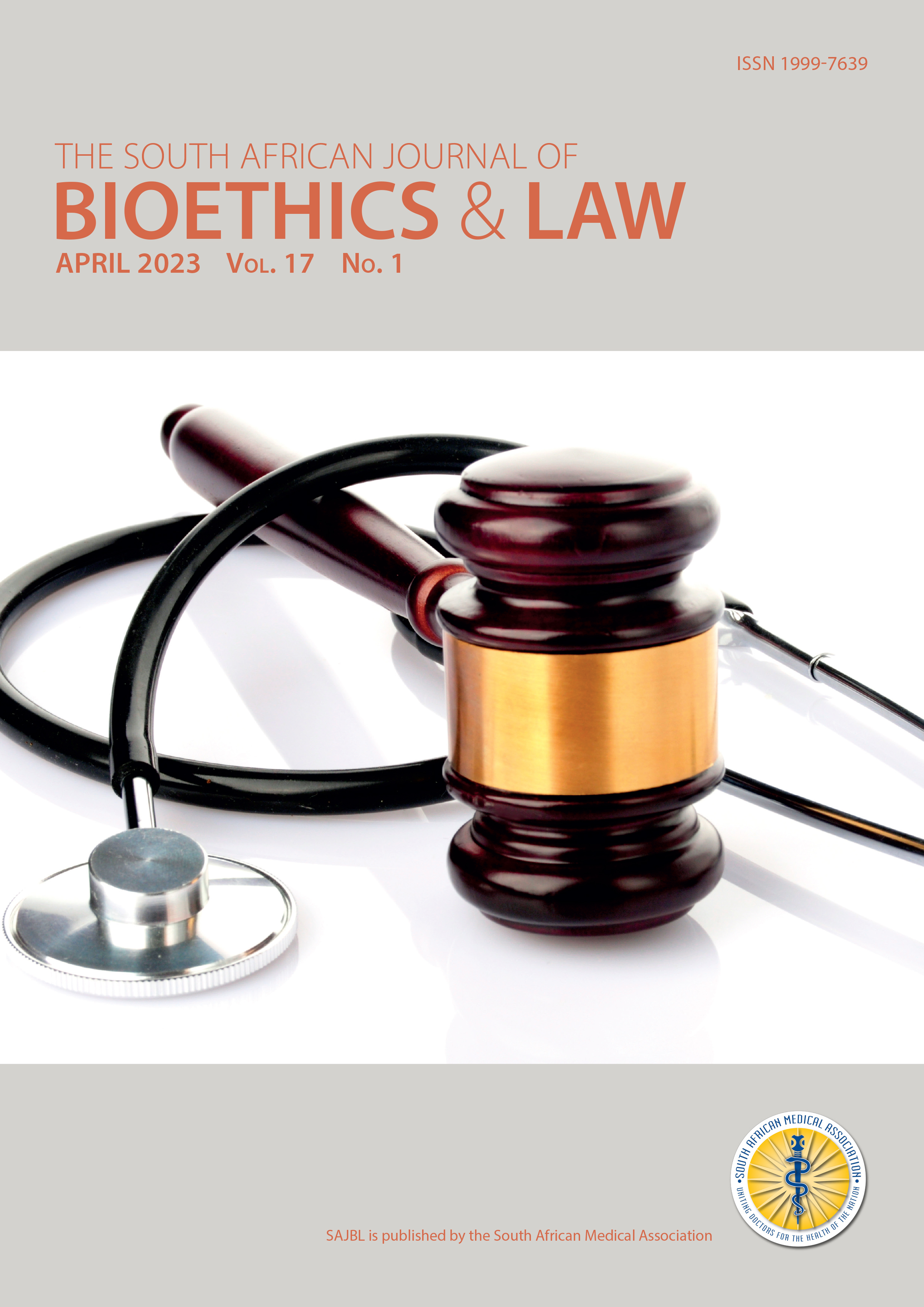The noble cause of medicine – fact or fallacy?
Main Article Content
Abstract
The aim of the article is threefold: to argue and motivate that unnecessary surgery is a worldwide phenomenon, that it exposes patients to unwarranted risks and that patients should actively participate in decision-making and take a shared responsibility to protect their interests. There is a firm belief that the enterprise of medicine is something of value – both intrinsically because being healthy is good and instrumentally since being healthy allows us to do what we wish to, to attain happiness and to live valuable lives. However, this can only hold if treatment is justified in terms of accepted evidence-based criteria. Imperative for all forms of treatment, including costly and invasive investigations, this is particularly true for surgical interventions because no surgery is without risk. Surgery performed outside of the norms of accepted indications constitutes a grave form of assault. Medicine is a noble cause if we stick to the rules and help each other to do so. As professionals, our most fundamental regulation is by ourselves.
Article Details
Issue
Section

This work is licensed under a Creative Commons Attribution-NonCommercial 4.0 International License.
The SAJBL is published under an Attribution-Non Commercial International Creative Commons Attribution (CC-BY-NC 4.0) License. Under this license, authors agree to make articles available to users, without permission or fees, for any lawful, non-commercial purpose. Users may read, copy, or re-use published content as long as the author and original place of publication are properly cited.
Exceptions to this license model is allowed for UKRI and research funded by organisations requiring that research be published open-access without embargo, under a CC-BY licence. As per the journals archiving policy, authors are permitted to self-archive the author-accepted manuscript (AAM) in a repository.
How to Cite
References
McMahan T. The noble cause of medicine. Letter to the Editor, Emerg Med News 2014; 36(2):23. https://doi.org/10.1097/01.EEM.0000443928.22466.59
DwyerC.Society’svalues,fearssupporthealthcare’snoblecause.PhysicianExec 2006; 28(3):8-10. https://repository.upenn.edu/handle/20.500.14332/35215
Johnston N Trust apologises for unnecessary operations on 90 patients. The
Times. May 11, 2021. https://www.thetimes.co.uk/article/trust-apologises- for-doctors-unnecessary-surgery-on-90-women-833bcwdbw (14 November 2022).
Johnson B. Rogue surgeon mistreated more than 1,000 patients report finds. Sky News, 4 February 2020. https://news.sky.com/story/rogue-surgeons-still- free-to-operate-report-on-disgraced-doctor-ian-paterson-finds-11926051 (14 November 2022).
Bulman M. Tens of thousands of NHS operations could be unnecessary, says leading surgeon. Independent, 12 June 2017. https://www.independent. co.uk/news/uk/home-news/nhs-operations-surgery-unnecessary-claim- medical-procedures-a7786626.html (3 November 2022).
Davis N. Unnecessary appendix surgery ‘performed on thousands in UK’. The Guardian, 4 Dec 2019. https://www.theguardian.com/society/2019/ dec/04/unnecessary-appendix-surgery-performed-on-thousands-in-uk (14 November 2022).
EislerP,HansenB.Thousandsofdoctorspracticingdespiteerrors,misconduct. USA Today. August 20 2013. https://psnet.ahrq.gov/issue/thousands-doctors- practicing-despite-errors-misconduct (21 November 2022).
Editorial. Unneeded operating charged to surgeons. The New York Times, February 17, 1953. https://www.nytimes.com/1953/02/17/archives/ unneeded-operating-charged-to-surgeons.html (13 December 2022)
Stahel PF, VanderHeiden TF, Kim FJ Why do surgeons continue to perform unnecessary surgery? Patient Saf Surg 2017;11:1 https://doi.org/10.1186/ s13037-016-0117-6
Stahel PF, VandeHeiden TF & Kim FJ (2017) ibid.
Matshidze KP, Richter LM, Ellison GT, Levin JB, McIntyre JA. Caesarean
section rates in South Africa: Evidence of bias among different ‘population groups’. Ethn Health 1998;3(1-2):71-79. https://doi.org/10.1080/13557858.19 98.9961850
Angolile CM, Max BL, Mushemba J, Mashauri HL. Global increased cesarean section rates and public health implications: A call to action. Health Sci Rep. 2023;6(5):e1274. Published 2023 May 18. doi:10.1002/hsr2.1274
Solanki GC, Cornell JE, Daviaud E, Fawcus S. Caesarean section rates in South Africa: A case study of the health systems challenges for the proposed National Health Insurance. S Afr Med J 2020 August;110(8):747-750. https:// doi.org/10.7196/SAMJ.2020.v110i8.14699
VanderHeiden TF, Kim FJ. Why do surgeons continue to perform unnecessary surgery? Patient Saf Surg 2017;11:1. https://doi.org/10.1186/s13037-016- 0117-6
Clore M. Unnecessary Surgery: When the doctor gambles, who puts up the stakes? Clorelaw website; January 21 2021. https://www.clorelaw.com/ insights/unnecessary-surgery-when-the-doctor-gambles-who-puts-up-the- stakes (9 January 2023).
Andreoletti M, Bina F. A defense of surgical procedures regulation. Theor Med Bioeth. 2022;43(2-3):155-168. doi:10.1007/s11017-022-09569-0
Todd D. Abstracted from the address to graduates of the Faculty of Medicine, University of Hong Kong, January 15, 2011, by Sir David Todd, Emeritus Professor, Department of Medicine, Hong Kong University. Highlighted in Frontispiece Summer 2016 (8)3 https://hekint.org/2017/01/29/medicine-a- noble-profession/ (5 December 2024).
